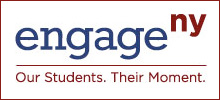11.10 - Social and Economic Change/Domestic Issues
From EngageNY
Racial, gender, and socioeconomic inequalities were addressed by individuals, groups, and organizations. Varying political philosophies prompted debates over the role of the federal government in regulating the economy and providing a social safety net.11.10a After World War II, long-term demands for equality by African Americans led to the civil rights movement. The efforts of individuals, groups, and institutions helped to redefine African American civil rights, though numerous issues remain unresolved.
- Students will examine the roles and impact of individuals such as Rev. Martin Luther King Jr., Stokely Carmichael, Fannie Lou Hamer, and Malcolm X on the movement and their perspectives on change.
- Students will examine the role of groups such as the National Association for the Advancement of Colored People (NAACP), Southern Christian Leadership Conference (SCLC), and Student Non-Violent Coordinating Committee (SNCC) in the movement, their goals and strategies, and major contributions.
- Students will examine judicial actions and legislative achievements during the movement, such as Brown v. Board of Education of Topeka (1954), the Civil Rights Act of 1964, Heart of Atlanta Motel, Inc. v. United States (1964) and the Voting Rights Act of 1965.
- Students will analyze the significance of key events in the movement, including the Montgomery bus boycott, federal intervention at Little Rock, Arkansas; the Birmingham protest; and the March on Washington.
- Students will trace the following efforts in groups, and successes/limitations:
- Modern women’s movement (e.g., The Feminine Mystique [1963], National Organization for Women , Equal Pay Act and Title IX, Roe v. Wade)
- Native Americans (e.g., American Indian Movement, Russell Means, native identity, and land claims)
- Brown Power (Chicano) movement (e.g., Cesar Chavez, United Farm Workers)
- People with disabilities (e.g. Individuals with Disabilities Education Act [1975], Americans with Disabilities Act [1990] )
- Rights of the accused (e.g., Mapp v. Ohio [1961], Gideon v. Wainwright [1963], Miranda v. Arizona [1966])
- Immigration (e.g., Immigration Act of 1965, Immigration Act of 1986, continuing debates over immigration reform)
- Gay Rights and the LGBT movement (e.g., Stonewall Inn riots [1969], efforts for equal legal rights)
- Environment (e.g., Silent Spring [1962], Clean Air Act of 1970, Clean Water Act of 1972, Endangered Species Act of 1973, Environmental Protection Agency [1970], Reagan’s policy)
- Student rights (e.g., Engel v. Vitale [1962], Tinker v. Des Moines School District [1969], New Jersey v. TLO [1985])
- Students will thoroughly investigate at least one of the efforts above.
- Students will compare and contrast the economic policies of President Johnson (Great Society) and President Reagan (Reaganomics) regarding the size and role of the federal government.
- Students will examine the causes of the financial panic of 2008 and the federal government‘s response to the Great Recession.
- Students will examine the debates over the role of the government in providing a social safety net, including the stability of the Social Security Trust Fund and Medicare Trust Fund, as well as changes under the Affordable Care Act.
Learn more on Engage NY
EngageNY.org is developed and maintained by the New York State Education Department (NYSED) to support the implementation of key aspects of the New York State Board of Regents Reform Agenda.
This is the official web site for current materials and resources related to the Regents Reform Agenda. The agenda includes the implementation of the New York State P-12 Common Core Learning Standards (CCLS), Teacher and Leader Effectiveness (TLE), and Data-Driven Instruction (DDI). EngageNY.org is dedicated to providing educators across New York State with real-time, professional learning tools and resources to support educators in reaching the State’s vision for a college and career ready education for all students.














